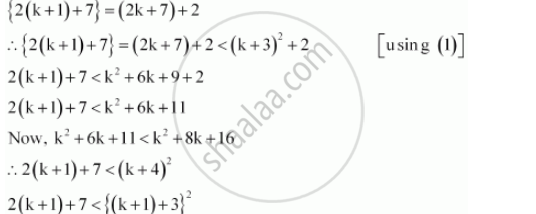Advertisements
Advertisements
Question
Prove the following by using the principle of mathematical induction for all n ∈ N (2n +7) < (n + 3)2
Solution
Let the given statement be P(n), i.e.,
P(n): (2n +7) < (n + 3)2
It can be observed that P(n) is true for n = 1 since 2.1 + 7 = 9 < (1 + 3)2 = 16, which is true.
Let P(k) be true for some positive integer k, i.e.,
(2k + 7) < (k + 3)2 … (1)
We shall now prove that P(k + 1) is true whenever P(k) is true.
Consider

Thus, P(k + 1) is true whenever P(k) is true.
Hence, by the principle of mathematical induction, statement P(n) is true for all natural numbers i.e., n.
APPEARS IN
RELATED QUESTIONS
Prove the following by using the principle of mathematical induction for all n ∈ N:
`1^3 + 2^3 + 3^3 + ... + n^3 = ((n(n+1))/2)^2`
Prove the following by using the principle of mathematical induction for all n ∈ N: 1.2.3 + 2.3.4 + … + n(n + 1) (n + 2) = `(n(n+1)(n+2)(n+3))/(4(n+3))`
Prove the following by using the principle of mathematical induction for all n ∈ N: 1.2 + 2.22 + 3.22 + … + n.2n = (n – 1) 2n+1 + 2
Prove the following by using the principle of mathematical induction for all n ∈ N:
Prove the following by using the principle of mathematical induction for all n ∈ N:
Prove the following by using the principle of mathematical induction for all n ∈ N:
Prove the following by using the principle of mathematical induction for all n ∈ N: `1+2+ 3+...+n<1/8(2n +1)^2`
Prove the following by using the principle of mathematical induction for all n ∈ N: 102n – 1 + 1 is divisible by 11
If P (n) is the statement "n2 + n is even", and if P (r) is true, then P (r + 1) is true.
If P (n) is the statement "n2 − n + 41 is prime", prove that P (1), P (2) and P (3) are true. Prove also that P (41) is not true.
1 + 3 + 5 + ... + (2n − 1) = n2 i.e., the sum of first n odd natural numbers is n2.
\[\frac{1}{2 . 5} + \frac{1}{5 . 8} + \frac{1}{8 . 11} + . . . + \frac{1}{(3n - 1)(3n + 2)} = \frac{n}{6n + 4}\]
12 + 32 + 52 + ... + (2n − 1)2 = \[\frac{1}{3}n(4 n^2 - 1)\]
32n+7 is divisible by 8 for all n ∈ N.
52n+2 −24n −25 is divisible by 576 for all n ∈ N.
Prove that n3 - 7n + 3 is divisible by 3 for all n \[\in\] N .
Prove that the number of subsets of a set containing n distinct elements is 2n, for all n \[\in\] N .
\[\text{ A sequence } x_0 , x_1 , x_2 , x_3 , . . . \text{ is defined by letting } x_0 = 5 and x_k = 4 + x_{k - 1}\text{ for all natural number k . } \]
\[\text{ Show that } x_n = 5 + 4n \text{ for all n } \in N \text{ using mathematical induction .} \]
Prove by method of induction, for all n ∈ N:
1.2 + 2.3 + 3.4 + ..... + n(n + 1) = `"n"/3 ("n" + 1)("n" + 2)`
Prove by method of induction, for all n ∈ N:
`1/(3.5) + 1/(5.7) + 1/(7.9) + ...` to n terms = `"n"/(3(2"n" + 3))`
Answer the following:
Prove, by method of induction, for all n ∈ N
8 + 17 + 26 + … + (9n – 1) = `"n"/2(9"n" + 7)`
Answer the following:
Prove by method of induction 52n − 22n is divisible by 3, for all n ∈ N
Prove statement by using the Principle of Mathematical Induction for all n ∈ N, that:
`(1 - 1/2^2).(1 - 1/3^2)...(1 - 1/n^2) = (n + 1)/(2n)`, for all natural numbers, n ≥ 2.
Prove statement by using the Principle of Mathematical Induction for all n ∈ N, that:
2n + 1 < 2n, for all natual numbers n ≥ 3.
Give an example of a statement P(n) which is true for all n ≥ 4 but P(1), P(2) and P(3) are not true. Justify your answer
Give an example of a statement P(n) which is true for all n. Justify your answer.
Prove the statement by using the Principle of Mathematical Induction:
32n – 1 is divisible by 8, for all natural numbers n.
Prove the statement by using the Principle of Mathematical Induction:
n(n2 + 5) is divisible by 6, for each natural number n.
Prove the statement by using the Principle of Mathematical Induction:
n2 < 2n for all natural numbers n ≥ 5.
Prove that, sinθ + sin2θ + sin3θ + ... + sinnθ = `((sin ntheta)/2 sin ((n + 1))/2 theta)/(sin theta/2)`, for all n ∈ N.
By using principle of mathematical induction for every natural number, (ab)n = ______.
